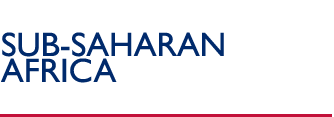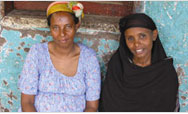 |
Sudan Reconstruction
USAID reconstruction programs, primarily operating in the South and the Three Areas (Abyei, Blue Nile, and Southern Kordofan), support the establishment of a foundation for a just and durable peace with the broad participation of the Sudanese people. Activities focus on governance, education, health, and economic growth.
 |
Sudanese women carry supplies down a dirt road near Bor
Credit: USAID |
Governance.
Public support for the Comprehensive Peace Agreement can be secured only through legitimate, democratic governance. USAID is working with the Government of Southern Sudan to assist the formation of core government institutions and systems and transparent budget and funding mechanisms. Assistance will also help plan for the upcoming census, support anticorruption reform, and foster dialogue between government and citizen groups. In preparation for the 2009 election, USAID will assist in developing and strengthening political parties, improving officials' methods for addressing citizen views, increasing participation in conflict mediation and resolution, and promoting a strong, vibrant civil society.
Education
Southern Sudan and the Three Areas suffer from a grave lack of educational systems and one of the lowest literacy rates in the world. USAID supports the development of basic education services and institutional and human capacity, with a focus on primary education, girls' education, teacher training, and institutional development. Programs target out-of-school youth, women, girls, returnees, ex-combatants, and other vulnerable people, and will eventually reach thousands of children, adult learners, and teachers. As a result, the Southern Sudanese will have greater access to a higher quality of basic education, and greater confidence in the government's ability to provide basic services.
Health
In Southern Sudan and the Three Areas, childhood deaths due to infectious diseases are rampant. Maternal mortality rates are among the highest in the world. HIV/AIDS is an emerging threat. As part of its effort to improve living conditions, USAID will foster local capacity to sustainably address priority health threats, strengthen maternal and child health services, reduce the burden of infectious diseases, and strengthen the systems that monitor and manage results. Activities will not only save lives, but also spread the benefits of peace.
Economic Growth
Years of war and neglect have left Southern Sudan and the Three Areas with severe deficiencies in transport, energy, communications, and basic structures needed to spark social and economic development. Infrastructure is essential to link isolated communities with towns, provide visible benefits from peace and stability, allow the development of markets and enterprises, and facilitate relief, resettlement, and good governance. USAID activities seek to improve infrastructure, agriculture, private sector competitiveness, and the environment. Entrepreneurs benefit from market support services, and major infrastructure programs improve roads, river transport, electricity, and telecommunications.
Back to Top ^ |


